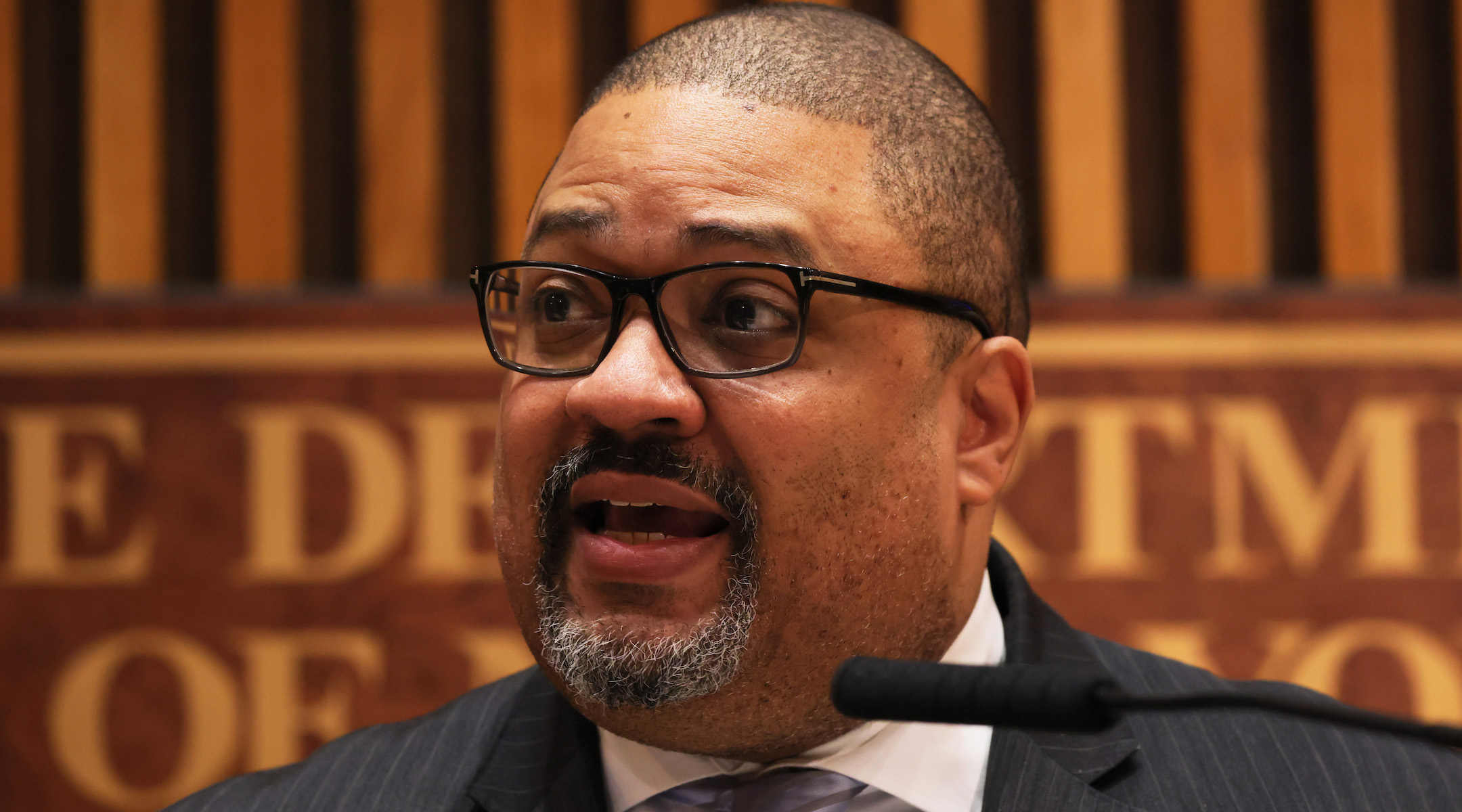Proposed legislation would expand number of hate crime-eligible charges in New York
The Hate Crimes Modernization Act would increase the list of hate crime-eligible charges in the state from 66 to 97

Manhattan DA Alvin Bragg speaks during a press conference at 1 Police Plaza on April 18, 2023 in New York City. (Michael M. Santiago/Getty Images)
(New York Jewish Week) – When three Upper East Side synagogues and one Hatzalah ambulance were tagged with antisemitic graffiti earlier this year, Manhattan District Attorney Alvin Bragg found that the act couldn’t be prosecuted as a hate crime. According to state law, graffiti isn’t eligible as a hate crime charge.
But new state legislation introduced on Monday afternoon, the Hate Crimes Modernization Act, would increase the list of hate crime-eligible charges in the state from 66 to 97 to include crimes such as graffiti, gang assault, aggravated murder and sexual abuse.
“As New Yorkers we can and should exercise our First Amendment rights to voice our opinions and petition the government about foreign policy and any other matters. We can disagree vigorously about policy,” Bragg said. “What we cannot do, and what we will not accept, is engaging in violence, harassment or property destruction against our fellow New Yorkers based on religion or ethnicity or any of the other protected categories specified in the statute.”
Jewish New Yorkers are protected from discrimination and hate crimes under the New York City Human Rights law. Classifying more crimes as hate crimes would make the consequences more severe for the perpetrator. When a specific offense is classified as a hate crime — that is, a charge that the person committing the offense was motivated by hatred of a person in a protected class — the crime and sentence can become more severe.
Bragg noted that antisemitic incidents have skyrocketed in the month since Hamas’ Oct. 7 attack on Israel. Since that date, the Anti-Defamation League has reported 646 antisemitic incidents across the country, a 400% increase over the same period last year.
Antisemitic incidents have similarly spiked in and around New York City in the same time span, according to data from the NYPD and a regional Jewish security agency.
And yet, Bragg said, he believes such crimes remain underreported and hopes that a broader definition of what constitutes a hate crime will aid in prosecuting more hate-based violence.
“I want to make it crystal-clear that harassment or violence against Jews here in Manhattan or against Muslims or Arab Americans here in Manhattan is plainly not acceptable,” Bragg said. “My office will, and does, investigate and prosecute hate crimes vigorously. And with the help of the state legislature, we hope to ensure that the scope of what we do, the scope of our hate crimes law, becomes sufficient to protect all of New York’s diverse communities.”
Despite graffiti itself not being included in the definition of a hate crime, Bragg was able to indict Lenny De La Rosa, the alleged perpetrator of the antisemitic graffiti, with four counts of criminal mischief as a hate crime on Oct. 31.
The legislation is sponsored by State Senator Brad Hoylman-Sigal, whose district includes much of Manhattan’s West Side, and State Assemblymember Grace Lee, whose district includes Chinatown and the Lower East Side. Both are Democrats.
“We haven’t seen the level of hate crimes in New York as we’re seeing right now,” said Hoylman-Sigal, who is both gay and Jewish. “Hate fueled attacks are on the rise, targeting almost every racial and ethnic group.”
Last week, Gov. Hochul announced up to $75 million in grants for local police departments and religious institutions to prevent and prosecute hate crimes, as well as to increase security.
“This legislation will make law what any New Yorker knows: If a crime is motivated by bias or bigotry, then it’s a hate crime, plain and simple,” Hoylman-Sigal said. “Let’s protect New Yorkers. Let’s fight the rising tide of bigotry. Let’s send a message to those who might perpetrate hate crimes: New York does not welcome you.”
This article originally appeared on JTA.org.















